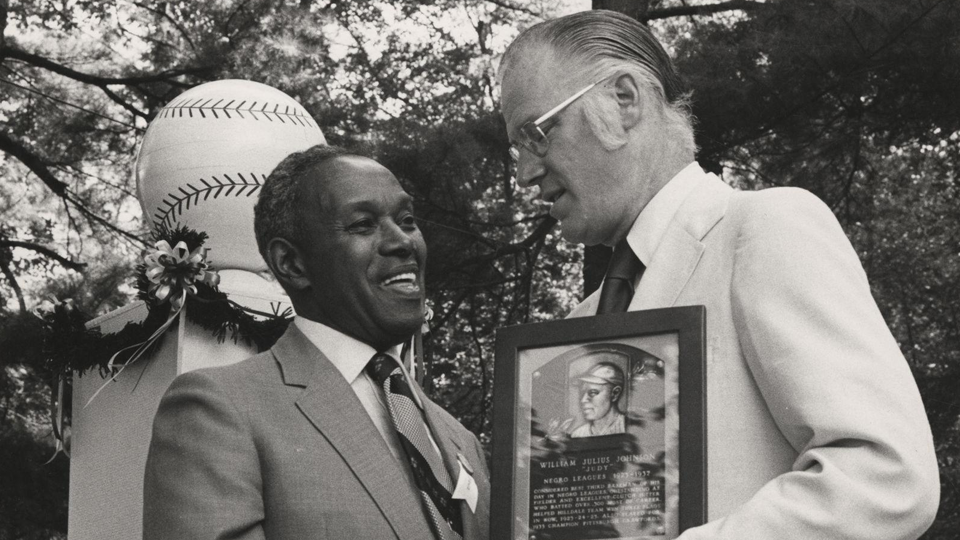In the April 6, 1930, edition of the Philadelphia Tribune, renowned sportswriter W. Rollo Wilson penned a compelling column that eloquently celebrated the brilliance of Julius "Judy" Johnson, the star third baseman destined for the National Baseball Hall of Fame in 1975.
Wilson's words resonate with admiration as he wrote, "Judy Johnson, one of the most valuable men in Negro baseball, and by all odds, the best third baseman." This declaration, he emphasized, was not a result of an overnight accomplishment but rather a testament to Johnson's prolonged, arduous, and brilliant climb to greatness.
Decades later, Johnson's extraordinary contributions, particularly during his illustrious tenure with the Hilldale Club in the 1920s, have been unequivocally validated.
Born in Wilmington, Delaware, Johnson, who passed away in 1989, remains an iconic figure in the annals of Philadelphia and African-American baseball history.
Despite achieving near-legendary status in the Negro Leagues, Johnson's legacy faced a profound injustice due to the insidious "gentlemen's agreement" that barred black ballplayers from "organized baseball" until Jackie Robinson's groundbreaking debut in 1947.
While Johnson's impact is duly acknowledged by hardcore enthusiasts and historians, his profound influence on Philadelphia's baseball history often eludes broader recognition.
This historical tragedy persisted until 1975, when a special committee on the Negro Leagues elected Johnson to the Hall of Fame, finally lifting the weight of segregation that had burdened him throughout his career.
The induction ceremony witnessed a poignant moment as the 74-year-old Johnson broke down in tears, marking the end of an era.
"I hope I can make many more trips here," Johnson expressed to the assembled crowd of 7,500 in Cooperstown, his voice wavering as tears flowed. "God bless you all."
Renowned Negro Leagues historian Neil Lanctot underscores Johnson's exceptional skills, describing him as a slick fielder, a great clutch hitter, and the linchpin of the 1920s Hilldale teams. Lanctot firmly believes that Johnson would have undoubtedly become a Major League star if integration had occurred earlier. Former teammate Ted Page echoed this sentiment, stating, “Judy Johnson was the smartest third baseman I ever came across. A scientific ballplayer that did everything with grace and poise.”
Johnson's legacy is inseparable from the revered Hilldale teams, guiding them to three straight Eastern Colored League crowns and a Colored World Series victory in 1925. Under the astute leadership of owner Ed Bolden, Hilldale became a dynasty and a pivotal component of the Eastern Colored League.
In 1929, Johnson's excellence was recognized as he was named the Negro League Most Valuable Player by prominent African-American newspapers, the Chicago Defender and the Pittsburgh Courier. The subsequent season saw him assume the role of player-manager for the Homestead Grays. In 1932, Johnson and most of the club transitioned to the Pittsburgh Crawfords. He later captained the 1935 club, featuring five future Hall of Famers, including himself, Cool Papa Bell, Oscar Charleston, and Josh Gibson, before retiring as a player in 1937.
Johnson batted above .300 in seven of the nine seasons in which the Negro Leagues kept statistics, retiring with a lifetime average of better than .340. His best season was 1925, when he batted .392.
Following the culmination of his playing career, the Philadelphia Athletics appointed Johnson as a scout in 1951. While unsuccessful in signing future home run king Hank Aaron and All-Star infielder Orestes “Minnie” Minoso, Johnson played a vital role in the early integration efforts of Major League Baseball.
Before the Athletics relocated to Kansas City in 1954, Johnson served as an assistant coach during spring training, offering guidance to black players Bob Trice and Vic Power. Although Johnson's assignment was temporary, it played a crucial role in the integration narrative, with Buck O’Neil often credited as the first black coach in Major League Baseball.
When Johnson passed away 35 years ago, the New York Times likened him to Pie Traynor, and Philadelphia Athletics owner Connie Mack remarked, "If Judy were only white, he could name his own price."



